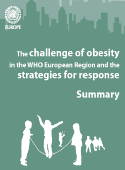The challenge of obesity in the WHO European Region and the strategies for response. Summary

Download
Edited by Francesco Branca, Haik Nikogosian and Tim Lobstein
2007, xiv + 59 pages
ISBN 978 92 890 1388 8
This publication is only available online.
In response to the obesity epidemic, the WHO Regional Office for Europe held a conference in November 2006, at which all Member States adopted the European Charter on Counteracting Obesity, which lists guiding principles and clear action areas at the local, regional, national and international levels for a wide range of stakeholders. This book comprises the first of two publications from the conference. It includes the Charter and summarizes the concepts and conclusions of the many technical papers written for the conference by a large group of experts in public health, nutrition and medicine.
In a brief, clear and easily accessible way, the summary illustrates the dynamics of the epidemic and its impact on public health throughout the WHO European Region, particularly in eastern countries. It describes how factors that increase the risk of obesity are shaped in different settings, such as the family, school, community and workplace. It makes both ethical and economic arguments for accelerating action against obesity, and analyses effective programmes and policies in different government sectors, such as education, health, agriculture and trade, urban planning and transport. The summary also describes how to design policies and programmes to prevent obesity and how to monitor progress, and calls for specific action by stakeholders: not only government sectors but also the private sector - including food manufacturers, advertisers and traders - and professional, consumers', and international and intergovernmental organizations such as the European Union.
It is time to act: 150 million adults and 15 million children in the Region are expected to be obese by 2010. Obesity not only harms the health and well-being of a vast proportion of the population and generates large expenditures by health services but also has a striking and unacceptable impact on children. This book briefly and clearly spells out ideas and information that will enable stakeholders across the Region, and particularly policy-makers, to work to stop and then reverse the obesity epidemic in Europe.



